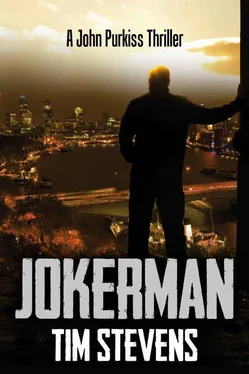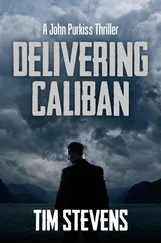Tim Stevens - Jokerman
Здесь есть возможность читать онлайн «Tim Stevens - Jokerman» весь текст электронной книги совершенно бесплатно (целиком полную версию без сокращений). В некоторых случаях можно слушать аудио, скачать через торрент в формате fb2 и присутствует краткое содержание. Год выпуска: 2013, Жанр: Триллер, на английском языке. Описание произведения, (предисловие) а так же отзывы посетителей доступны на портале библиотеки ЛибКат.
- Название:Jokerman
- Автор:
- Жанр:
- Год:2013
- ISBN:нет данных
- Рейтинг книги:4 / 5. Голосов: 1
-
Избранное:Добавить в избранное
- Отзывы:
-
Ваша оценка:
- 80
- 1
- 2
- 3
- 4
- 5
Jokerman: краткое содержание, описание и аннотация
Предлагаем к чтению аннотацию, описание, краткое содержание или предисловие (зависит от того, что написал сам автор книги «Jokerman»). Если вы не нашли необходимую информацию о книге — напишите в комментариях, мы постараемся отыскать её.
Jokerman — читать онлайн бесплатно полную книгу (весь текст) целиком
Ниже представлен текст книги, разбитый по страницам. Система сохранения места последней прочитанной страницы, позволяет с удобством читать онлайн бесплатно книгу «Jokerman», без необходимости каждый раз заново искать на чём Вы остановились. Поставьте закладку, и сможете в любой момент перейти на страницу, на которой закончили чтение.
Интервал:
Закладка:
Purkiss shook his head. She’s really got to you.
The buzzing of his phone shook him out of his thoughts. He picked it up.
It was Hannah.
‘John, I’m sorry about this. I missed the flight. Delays at check in, and at the scanner.’
‘Do you think you’ve been compromised?’
‘No, it’s unlikely. Nobody took much time over me. Just large numbers of passengers to process, and too few desks to cope.’
Purkiss looked at his watch. One o’clock.
‘There’s another flight at six in the morning,’ Hannah said. ‘Seven hours from now. I’ve booked a seat on that. But it means I’ll be there with you only around two in the afternoon.’
‘All right,’ he said. ‘Can’t be helped.’
‘What are you going to do?’
‘No point just sitting here at the airport,’ he said. ‘I’ll head into the city. Scout around.’
‘Don’t approach the Scipio Rand offices, will you? Not without me.’
‘I won’t,’ he said.
They rang off.
Purkiss sat sipping his coffee, thinking.
Don’t approach Scipio Rand , she’d said, and he’d agreed. But they both knew the temptation would be too great for him to resist. He wasn’t given to loitering about for any length of time, not when there was a target to be investigated.
It was of course entirely possible that Hannah had missed the flight. Heathrow was a notoriously busy airport, and it wasn’t as if Hannah could use her Security Service credentials to buy herself special treatment, working off the books as she was.
But it was also possible she’d deliberately not taken the flight.
The vast, echoing terminal around Purkiss seemed suddenly frighteningly smaller, as though the walls and ceiling were closing in, squeezed by the crushing emptiness of the surrounding desert outside.
If Hannah had missed the flight on purpose, it suggested that she knew Purkiss was going to investigate Scipio Rand on his own, regardless of what he told her. And that meant she knew he’d be walking into a set up. A trap.
His mind rewound and replayed the events in order.
Hannah, appearing out of nowhere just before the bomb in Mohammed Al-Bayati’s Range Rover had gone off.
Hannah, just happening to have found a notebook of Morrow’s with leads pointing to Dennis Arkwright.
Hannah, present at the interview with Arkwright at the very moment he had come under attack.
It didn’t make sense. It didn’t tie together neatly, or even at all. But, as with Vale, it was a series of seemingly unconnected little coincidences and oddities which, in the light of Hannah’s failure to board the plane, unsettled Purkiss.
Without turning his head too obviously he scanned the terminal, or at least as much of it as he could see from where he was sitting. People stood around or ambled or hurried, singly and in pairs and small groups. There was no evident surveillance in place. But then, if it had been obtrusive, it wouldn’t have been surveillance at all.
Purkiss felt the gnawings of unease which would, if indulged, progress to panicky helplessness. A rat in a corner, with no apparent means of escape, will lapse into acceptance of its situation. Purkiss was in a different position, because he didn’t know where the danger was, or which direction it would come from.
Except he did, in a sense. Part of the danger was internal. The corrosive effects of mistrust, of suspicion of those once thought loyal, could be every bit as hazardous as an external threat.
Purkiss closed his eyes to slits, just enough not to exclude all visual data. He drew a deep breath through his nose, centring himself.
Into an impossible cube-shaped container, with no visible seams, he placed mental images of Vale and Hannah. He could still see them hazily through the opaque walls of the box, so he thickened the sides like the cataracts in an elderly eye, until the faces within had disappeared.
Then he allowed the box to plunge, impossibly deeply, into the most inaccessible reaches of his being.
He released the breath. Opened his eyes fully. Found himself not in the tortured past, or the speculation-riddled future, but in the now .
Purkiss left the coffee shop, strode the length of the terminal towards an all-night car rental kiosk he’d seen earlier. He was aware of the soft peeling noise of his soles on the polished floor with every step he took, of the coffee-and-spices aromas breezing around him, of the murmur and susurration of a cleaning machine that hummed robotically past, its driver seemingly less alive than it was.
At the kiosk he considered the options offered to him. Technical requirements — speed, reliability, protection in the event of a collision — always had to be weighed up against the need for discretion and lack of obtrusiveness when choosing a vehicle in a hostile field. After a few minutes’ thought, Purkiss selected a two-year-old silver Audi saloon.
Even in the two hours since he’d stepped off the plane, the heat had built up outside. Purkiss glanced at a digital display on the terminal wall as he walked to collect his car. Twenty-eight degrees Celsius already, at half-past one in the morning. By dawn it would have reached thirty, at least. By noon, forty or more.
He hadn’t been in the Middle East for six years, and was therefore not acclimatised. It meant that any confrontation with the enemy would best take place in the next few hours, before Purkiss was at a distinct disadvantage.
The Audi’s engine felt smooth and beautifully tuned, the air conditioning kicking in immediately. Purkiss took it for a few turns around the car park, getting a feel for the way it handled. Then he headed for the petrol station near the exit. He filled up the tank, marvelling as he had done when he’d first visited the Gulf at the astonishingly cheap price of fuel, before taking the sign for King Fahd Road towards Riyadh, a little over twenty miles to the south.
Despite the bright lights of the highway, the surprisingly active traffic, the sky overhead was clear and luminous with stars, light pollution from the distant city having little effect here. Clear skies were dangerous, in Purkiss’s experience. They reminded him of happier times — Marseille, chiefly — and tended to have a mesmerising, lulling effect. He forced himself to focus on the immediate environment.
Night-time countersurveillance was tricky, because you could never be as certain as you could in daylight that the set of headlights behind you were the ones that had been tailing you since the start of your journey. But the highway was vividly lit in sodium, and by the time the traffic began to build up and slow on the outskirts of the city, Purkiss had identified the tag.
Forty
Riyadh’s broad highways and boulevards, elaborate mosques and palm trees all gave Purkiss the impression of a showcase city, a little tatty around the edges and without quite matching the garish kitsch of Dubai or Abu Dhabi.
He used the Audi’s satellite navigation system to identify the Diplomatic Quarter, then took a deliberate wrong turn, braking late as though in frustration at having missed the road he wanted. As planned, he found himself in a one-way system and therefore couldn’t double back.
In his rearview mirror, the black Lexus hung back, keeping pace with him.
Purkiss had identified it through a simple manoeuvre back on the highway leading from the airport. He’d accelerated to overtake two marginally slower cars in front of him and had dropped in ahead of the first one. The Lexus, not wanting to lose him, had muscled in one car behind. His move had been unremarkable, unlikely to attract suspicion. That of the Lexus confirmed what he’d thought: it had been tagging him since he’d left the airport.
Читать дальшеИнтервал:
Закладка:
Похожие книги на «Jokerman»
Представляем Вашему вниманию похожие книги на «Jokerman» списком для выбора. Мы отобрали схожую по названию и смыслу литературу в надежде предоставить читателям больше вариантов отыскать новые, интересные, ещё непрочитанные произведения.
Обсуждение, отзывы о книге «Jokerman» и просто собственные мнения читателей. Оставьте ваши комментарии, напишите, что Вы думаете о произведении, его смысле или главных героях. Укажите что конкретно понравилось, а что нет, и почему Вы так считаете.












